Digital Entrepreneurship and Technology Innovations Essay, 2020
VerifiedAdded on 2022/08/25
|9
|2209
|15
Essay
AI Summary
This essay examines how digital entrepreneurs are capitalizing on global business opportunities through technological advancements, particularly within the framework of globalization. It explores the shift towards digital entrepreneurship driven by ICT and its influence on business practices. The essay analyzes the necessity for companies to innovate and adopt technology to remain competitive in saturated markets, highlighting the role of cloud computing, AI, and predictive analytics. It delves into the skills and organizational structures essential for fostering technological innovations and evaluates the alignment of digital entrepreneurship with the United Nations' Sustainable Development Goals (SDGs), specifically SDG 9, which focuses on industry, innovation, and infrastructure. Furthermore, it discusses the challenges of globalization, including political uncertainties and the importance of digital skills, while also acknowledging the potential for digital entrepreneurship to address global issues and contribute to a sustainable society. The essay concludes by emphasizing the contribution of digital entrepreneurship to SDG 9, 12 and 13, and the need for businesses to embrace globalization to expand and succeed.

Running head: INTRODUCTION TO BUSINESS
INTRODUCTION TO BUSINESS
Name of the Student:
Name of the University:
Author note:
INTRODUCTION TO BUSINESS
Name of the Student:
Name of the University:
Author note:
Paraphrase This Document
Need a fresh take? Get an instant paraphrase of this document with our AI Paraphraser
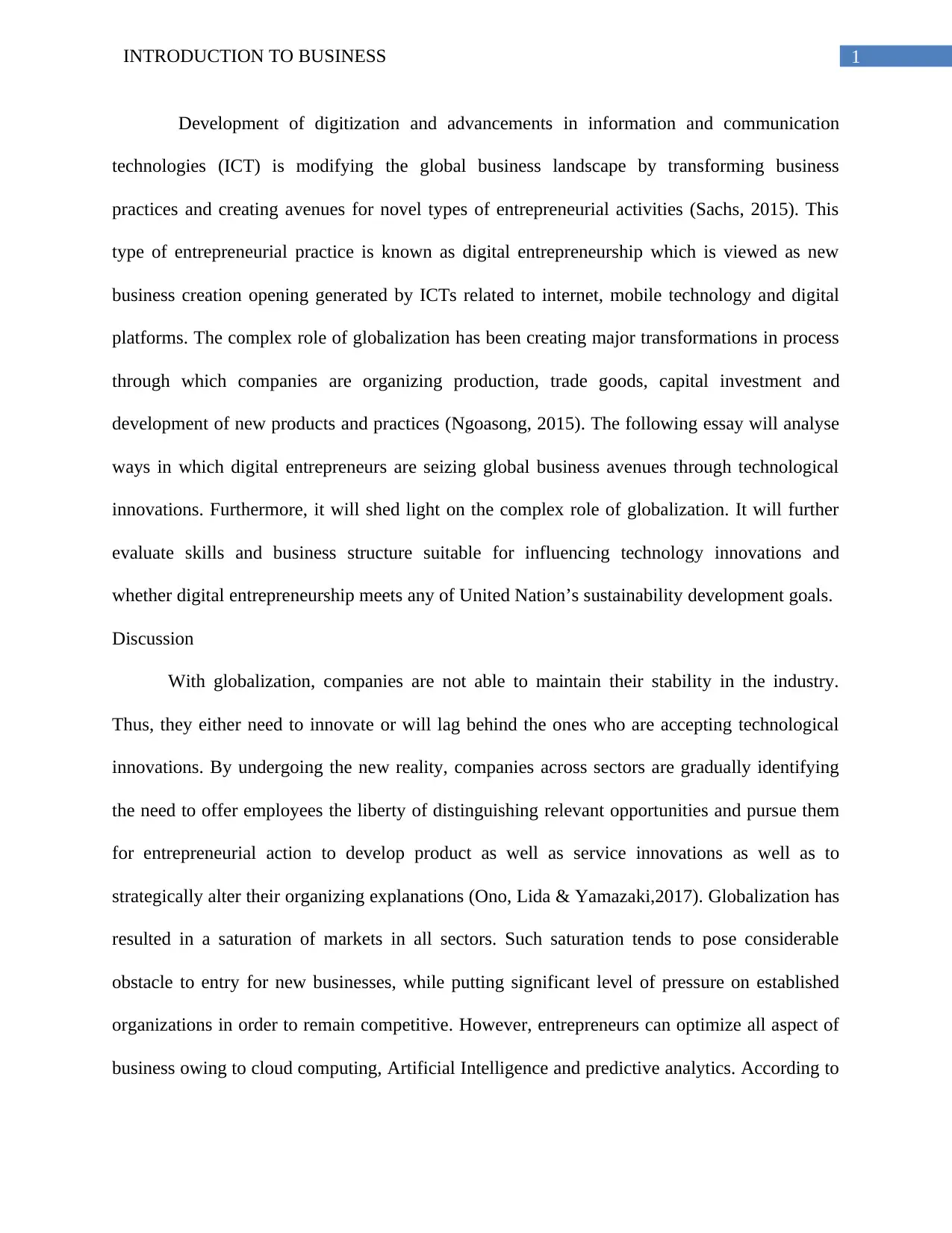
1INTRODUCTION TO BUSINESS
Development of digitization and advancements in information and communication
technologies (ICT) is modifying the global business landscape by transforming business
practices and creating avenues for novel types of entrepreneurial activities (Sachs, 2015). This
type of entrepreneurial practice is known as digital entrepreneurship which is viewed as new
business creation opening generated by ICTs related to internet, mobile technology and digital
platforms. The complex role of globalization has been creating major transformations in process
through which companies are organizing production, trade goods, capital investment and
development of new products and practices (Ngoasong, 2015). The following essay will analyse
ways in which digital entrepreneurs are seizing global business avenues through technological
innovations. Furthermore, it will shed light on the complex role of globalization. It will further
evaluate skills and business structure suitable for influencing technology innovations and
whether digital entrepreneurship meets any of United Nation’s sustainability development goals.
Discussion
With globalization, companies are not able to maintain their stability in the industry.
Thus, they either need to innovate or will lag behind the ones who are accepting technological
innovations. By undergoing the new reality, companies across sectors are gradually identifying
the need to offer employees the liberty of distinguishing relevant opportunities and pursue them
for entrepreneurial action to develop product as well as service innovations as well as to
strategically alter their organizing explanations (Ono, Lida & Yamazaki,2017). Globalization has
resulted in a saturation of markets in all sectors. Such saturation tends to pose considerable
obstacle to entry for new businesses, while putting significant level of pressure on established
organizations in order to remain competitive. However, entrepreneurs can optimize all aspect of
business owing to cloud computing, Artificial Intelligence and predictive analytics. According to
Development of digitization and advancements in information and communication
technologies (ICT) is modifying the global business landscape by transforming business
practices and creating avenues for novel types of entrepreneurial activities (Sachs, 2015). This
type of entrepreneurial practice is known as digital entrepreneurship which is viewed as new
business creation opening generated by ICTs related to internet, mobile technology and digital
platforms. The complex role of globalization has been creating major transformations in process
through which companies are organizing production, trade goods, capital investment and
development of new products and practices (Ngoasong, 2015). The following essay will analyse
ways in which digital entrepreneurs are seizing global business avenues through technological
innovations. Furthermore, it will shed light on the complex role of globalization. It will further
evaluate skills and business structure suitable for influencing technology innovations and
whether digital entrepreneurship meets any of United Nation’s sustainability development goals.
Discussion
With globalization, companies are not able to maintain their stability in the industry.
Thus, they either need to innovate or will lag behind the ones who are accepting technological
innovations. By undergoing the new reality, companies across sectors are gradually identifying
the need to offer employees the liberty of distinguishing relevant opportunities and pursue them
for entrepreneurial action to develop product as well as service innovations as well as to
strategically alter their organizing explanations (Ono, Lida & Yamazaki,2017). Globalization has
resulted in a saturation of markets in all sectors. Such saturation tends to pose considerable
obstacle to entry for new businesses, while putting significant level of pressure on established
organizations in order to remain competitive. However, entrepreneurs can optimize all aspect of
business owing to cloud computing, Artificial Intelligence and predictive analytics. According to
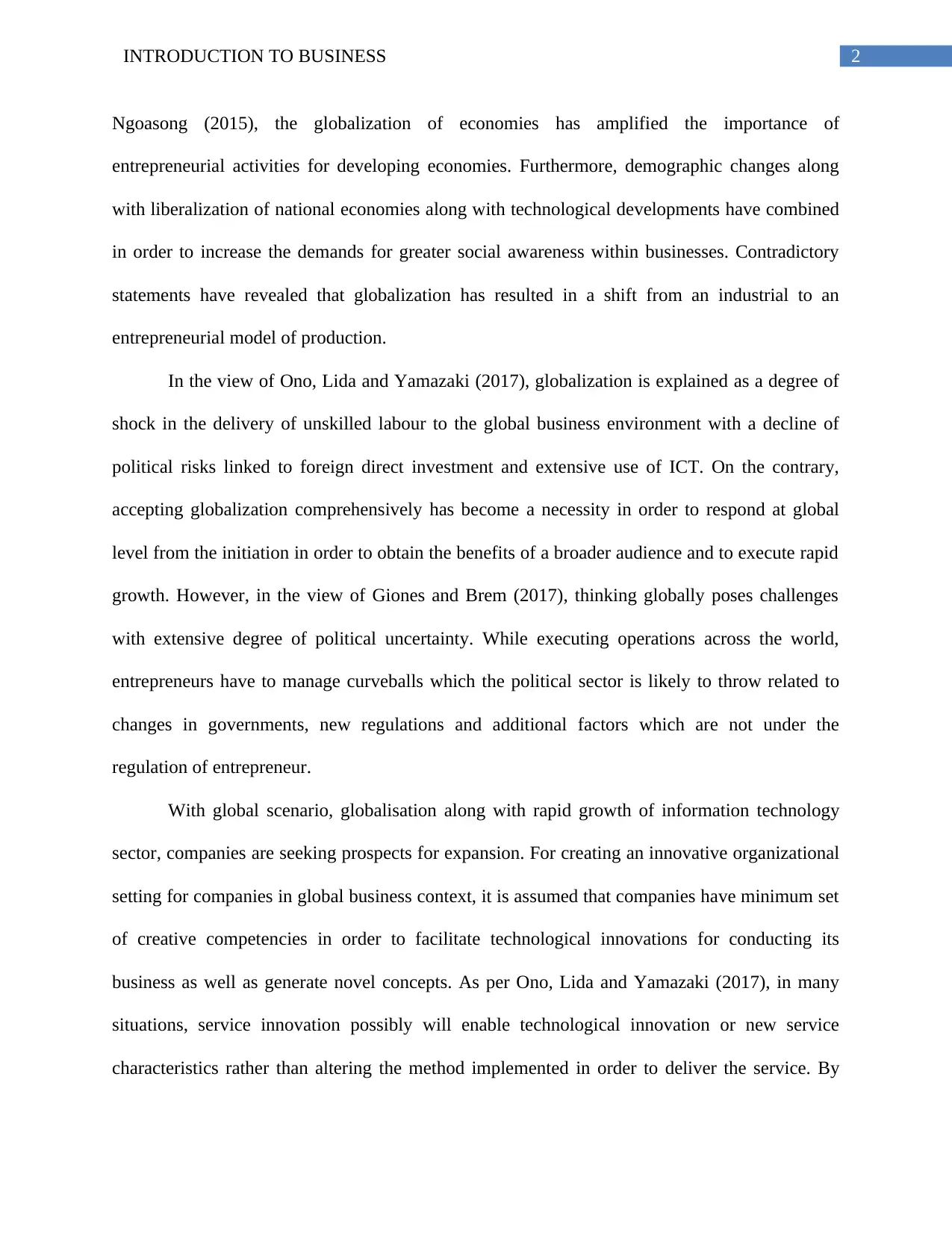
2INTRODUCTION TO BUSINESS
Ngoasong (2015), the globalization of economies has amplified the importance of
entrepreneurial activities for developing economies. Furthermore, demographic changes along
with liberalization of national economies along with technological developments have combined
in order to increase the demands for greater social awareness within businesses. Contradictory
statements have revealed that globalization has resulted in a shift from an industrial to an
entrepreneurial model of production.
In the view of Ono, Lida and Yamazaki (2017), globalization is explained as a degree of
shock in the delivery of unskilled labour to the global business environment with a decline of
political risks linked to foreign direct investment and extensive use of ICT. On the contrary,
accepting globalization comprehensively has become a necessity in order to respond at global
level from the initiation in order to obtain the benefits of a broader audience and to execute rapid
growth. However, in the view of Giones and Brem (2017), thinking globally poses challenges
with extensive degree of political uncertainty. While executing operations across the world,
entrepreneurs have to manage curveballs which the political sector is likely to throw related to
changes in governments, new regulations and additional factors which are not under the
regulation of entrepreneur.
With global scenario, globalisation along with rapid growth of information technology
sector, companies are seeking prospects for expansion. For creating an innovative organizational
setting for companies in global business context, it is assumed that companies have minimum set
of creative competencies in order to facilitate technological innovations for conducting its
business as well as generate novel concepts. As per Ono, Lida and Yamazaki (2017), in many
situations, service innovation possibly will enable technological innovation or new service
characteristics rather than altering the method implemented in order to deliver the service. By
Ngoasong (2015), the globalization of economies has amplified the importance of
entrepreneurial activities for developing economies. Furthermore, demographic changes along
with liberalization of national economies along with technological developments have combined
in order to increase the demands for greater social awareness within businesses. Contradictory
statements have revealed that globalization has resulted in a shift from an industrial to an
entrepreneurial model of production.
In the view of Ono, Lida and Yamazaki (2017), globalization is explained as a degree of
shock in the delivery of unskilled labour to the global business environment with a decline of
political risks linked to foreign direct investment and extensive use of ICT. On the contrary,
accepting globalization comprehensively has become a necessity in order to respond at global
level from the initiation in order to obtain the benefits of a broader audience and to execute rapid
growth. However, in the view of Giones and Brem (2017), thinking globally poses challenges
with extensive degree of political uncertainty. While executing operations across the world,
entrepreneurs have to manage curveballs which the political sector is likely to throw related to
changes in governments, new regulations and additional factors which are not under the
regulation of entrepreneur.
With global scenario, globalisation along with rapid growth of information technology
sector, companies are seeking prospects for expansion. For creating an innovative organizational
setting for companies in global business context, it is assumed that companies have minimum set
of creative competencies in order to facilitate technological innovations for conducting its
business as well as generate novel concepts. As per Ono, Lida and Yamazaki (2017), in many
situations, service innovation possibly will enable technological innovation or new service
characteristics rather than altering the method implemented in order to deliver the service. By
⊘ This is a preview!⊘
Do you want full access?
Subscribe today to unlock all pages.

Trusted by 1+ million students worldwide
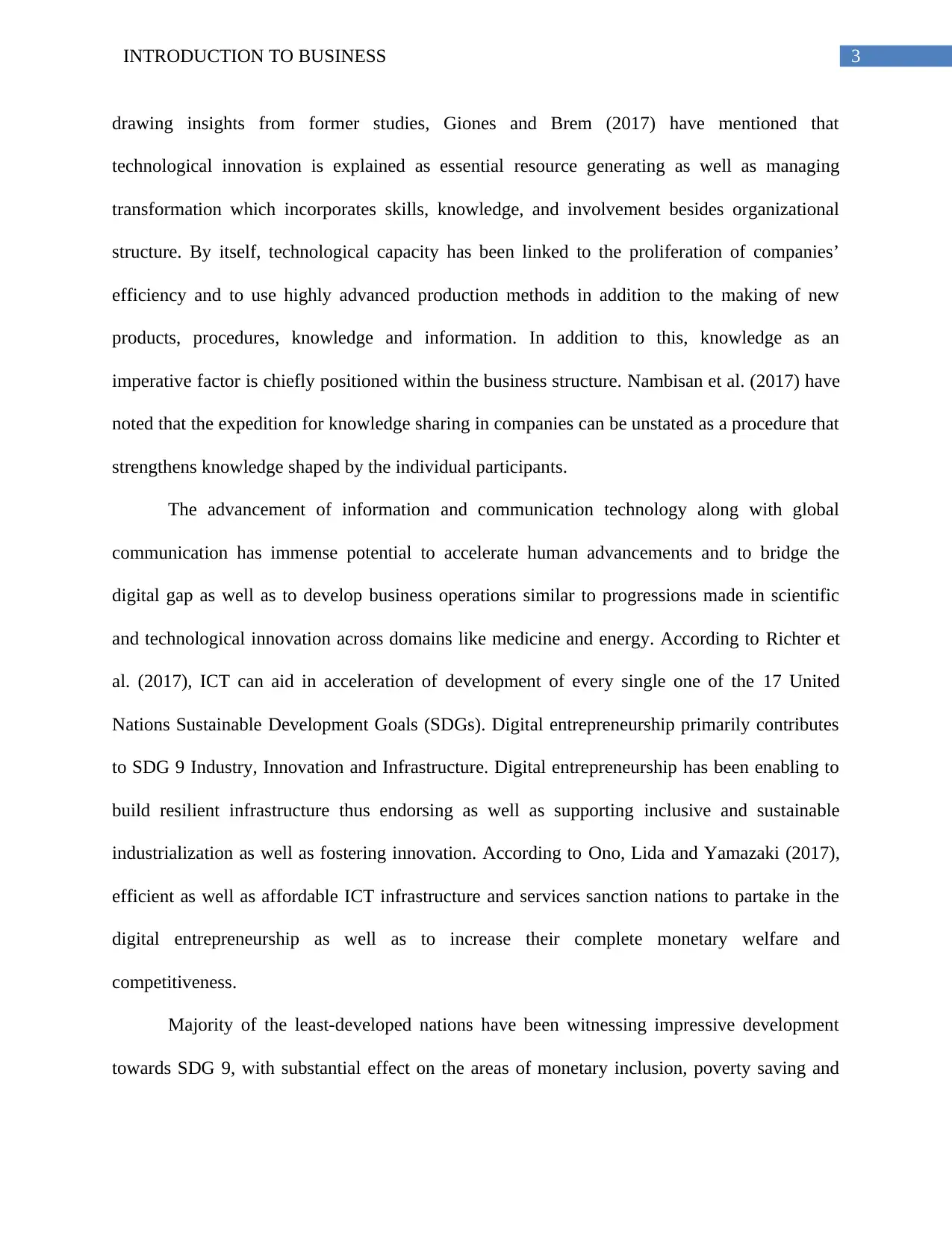
3INTRODUCTION TO BUSINESS
drawing insights from former studies, Giones and Brem (2017) have mentioned that
technological innovation is explained as essential resource generating as well as managing
transformation which incorporates skills, knowledge, and involvement besides organizational
structure. By itself, technological capacity has been linked to the proliferation of companies’
efficiency and to use highly advanced production methods in addition to the making of new
products, procedures, knowledge and information. In addition to this, knowledge as an
imperative factor is chiefly positioned within the business structure. Nambisan et al. (2017) have
noted that the expedition for knowledge sharing in companies can be unstated as a procedure that
strengthens knowledge shaped by the individual participants.
The advancement of information and communication technology along with global
communication has immense potential to accelerate human advancements and to bridge the
digital gap as well as to develop business operations similar to progressions made in scientific
and technological innovation across domains like medicine and energy. According to Richter et
al. (2017), ICT can aid in acceleration of development of every single one of the 17 United
Nations Sustainable Development Goals (SDGs). Digital entrepreneurship primarily contributes
to SDG 9 Industry, Innovation and Infrastructure. Digital entrepreneurship has been enabling to
build resilient infrastructure thus endorsing as well as supporting inclusive and sustainable
industrialization as well as fostering innovation. According to Ono, Lida and Yamazaki (2017),
efficient as well as affordable ICT infrastructure and services sanction nations to partake in the
digital entrepreneurship as well as to increase their complete monetary welfare and
competitiveness.
Majority of the least-developed nations have been witnessing impressive development
towards SDG 9, with substantial effect on the areas of monetary inclusion, poverty saving and
drawing insights from former studies, Giones and Brem (2017) have mentioned that
technological innovation is explained as essential resource generating as well as managing
transformation which incorporates skills, knowledge, and involvement besides organizational
structure. By itself, technological capacity has been linked to the proliferation of companies’
efficiency and to use highly advanced production methods in addition to the making of new
products, procedures, knowledge and information. In addition to this, knowledge as an
imperative factor is chiefly positioned within the business structure. Nambisan et al. (2017) have
noted that the expedition for knowledge sharing in companies can be unstated as a procedure that
strengthens knowledge shaped by the individual participants.
The advancement of information and communication technology along with global
communication has immense potential to accelerate human advancements and to bridge the
digital gap as well as to develop business operations similar to progressions made in scientific
and technological innovation across domains like medicine and energy. According to Richter et
al. (2017), ICT can aid in acceleration of development of every single one of the 17 United
Nations Sustainable Development Goals (SDGs). Digital entrepreneurship primarily contributes
to SDG 9 Industry, Innovation and Infrastructure. Digital entrepreneurship has been enabling to
build resilient infrastructure thus endorsing as well as supporting inclusive and sustainable
industrialization as well as fostering innovation. According to Ono, Lida and Yamazaki (2017),
efficient as well as affordable ICT infrastructure and services sanction nations to partake in the
digital entrepreneurship as well as to increase their complete monetary welfare and
competitiveness.
Majority of the least-developed nations have been witnessing impressive development
towards SDG 9, with substantial effect on the areas of monetary inclusion, poverty saving and
Paraphrase This Document
Need a fresh take? Get an instant paraphrase of this document with our AI Paraphraser
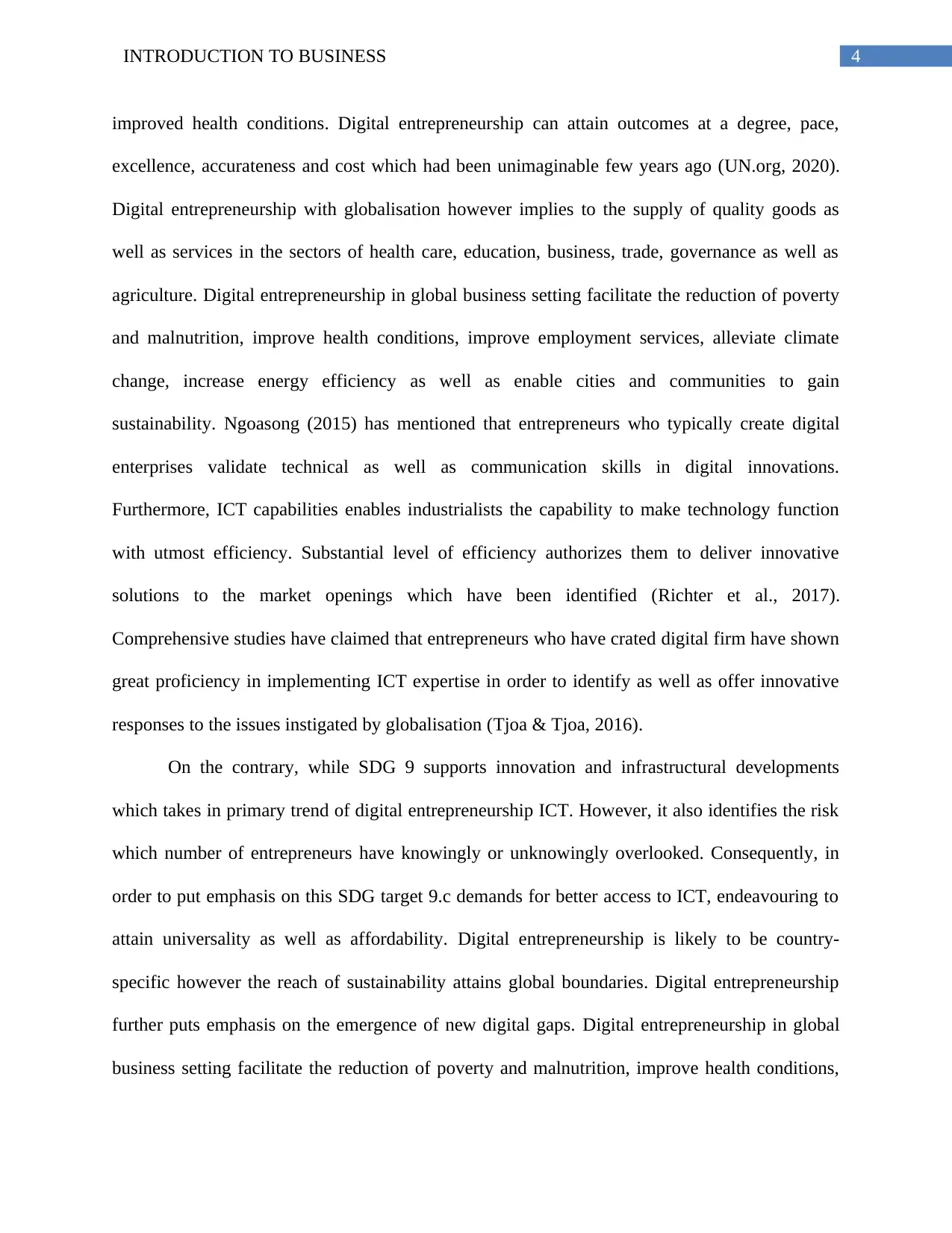
4INTRODUCTION TO BUSINESS
improved health conditions. Digital entrepreneurship can attain outcomes at a degree, pace,
excellence, accurateness and cost which had been unimaginable few years ago (UN.org, 2020).
Digital entrepreneurship with globalisation however implies to the supply of quality goods as
well as services in the sectors of health care, education, business, trade, governance as well as
agriculture. Digital entrepreneurship in global business setting facilitate the reduction of poverty
and malnutrition, improve health conditions, improve employment services, alleviate climate
change, increase energy efficiency as well as enable cities and communities to gain
sustainability. Ngoasong (2015) has mentioned that entrepreneurs who typically create digital
enterprises validate technical as well as communication skills in digital innovations.
Furthermore, ICT capabilities enables industrialists the capability to make technology function
with utmost efficiency. Substantial level of efficiency authorizes them to deliver innovative
solutions to the market openings which have been identified (Richter et al., 2017).
Comprehensive studies have claimed that entrepreneurs who have crated digital firm have shown
great proficiency in implementing ICT expertise in order to identify as well as offer innovative
responses to the issues instigated by globalisation (Tjoa & Tjoa, 2016).
On the contrary, while SDG 9 supports innovation and infrastructural developments
which takes in primary trend of digital entrepreneurship ICT. However, it also identifies the risk
which number of entrepreneurs have knowingly or unknowingly overlooked. Consequently, in
order to put emphasis on this SDG target 9.c demands for better access to ICT, endeavouring to
attain universality as well as affordability. Digital entrepreneurship is likely to be country-
specific however the reach of sustainability attains global boundaries. Digital entrepreneurship
further puts emphasis on the emergence of new digital gaps. Digital entrepreneurship in global
business setting facilitate the reduction of poverty and malnutrition, improve health conditions,
improved health conditions. Digital entrepreneurship can attain outcomes at a degree, pace,
excellence, accurateness and cost which had been unimaginable few years ago (UN.org, 2020).
Digital entrepreneurship with globalisation however implies to the supply of quality goods as
well as services in the sectors of health care, education, business, trade, governance as well as
agriculture. Digital entrepreneurship in global business setting facilitate the reduction of poverty
and malnutrition, improve health conditions, improve employment services, alleviate climate
change, increase energy efficiency as well as enable cities and communities to gain
sustainability. Ngoasong (2015) has mentioned that entrepreneurs who typically create digital
enterprises validate technical as well as communication skills in digital innovations.
Furthermore, ICT capabilities enables industrialists the capability to make technology function
with utmost efficiency. Substantial level of efficiency authorizes them to deliver innovative
solutions to the market openings which have been identified (Richter et al., 2017).
Comprehensive studies have claimed that entrepreneurs who have crated digital firm have shown
great proficiency in implementing ICT expertise in order to identify as well as offer innovative
responses to the issues instigated by globalisation (Tjoa & Tjoa, 2016).
On the contrary, while SDG 9 supports innovation and infrastructural developments
which takes in primary trend of digital entrepreneurship ICT. However, it also identifies the risk
which number of entrepreneurs have knowingly or unknowingly overlooked. Consequently, in
order to put emphasis on this SDG target 9.c demands for better access to ICT, endeavouring to
attain universality as well as affordability. Digital entrepreneurship is likely to be country-
specific however the reach of sustainability attains global boundaries. Digital entrepreneurship
further puts emphasis on the emergence of new digital gaps. Digital entrepreneurship in global
business setting facilitate the reduction of poverty and malnutrition, improve health conditions,
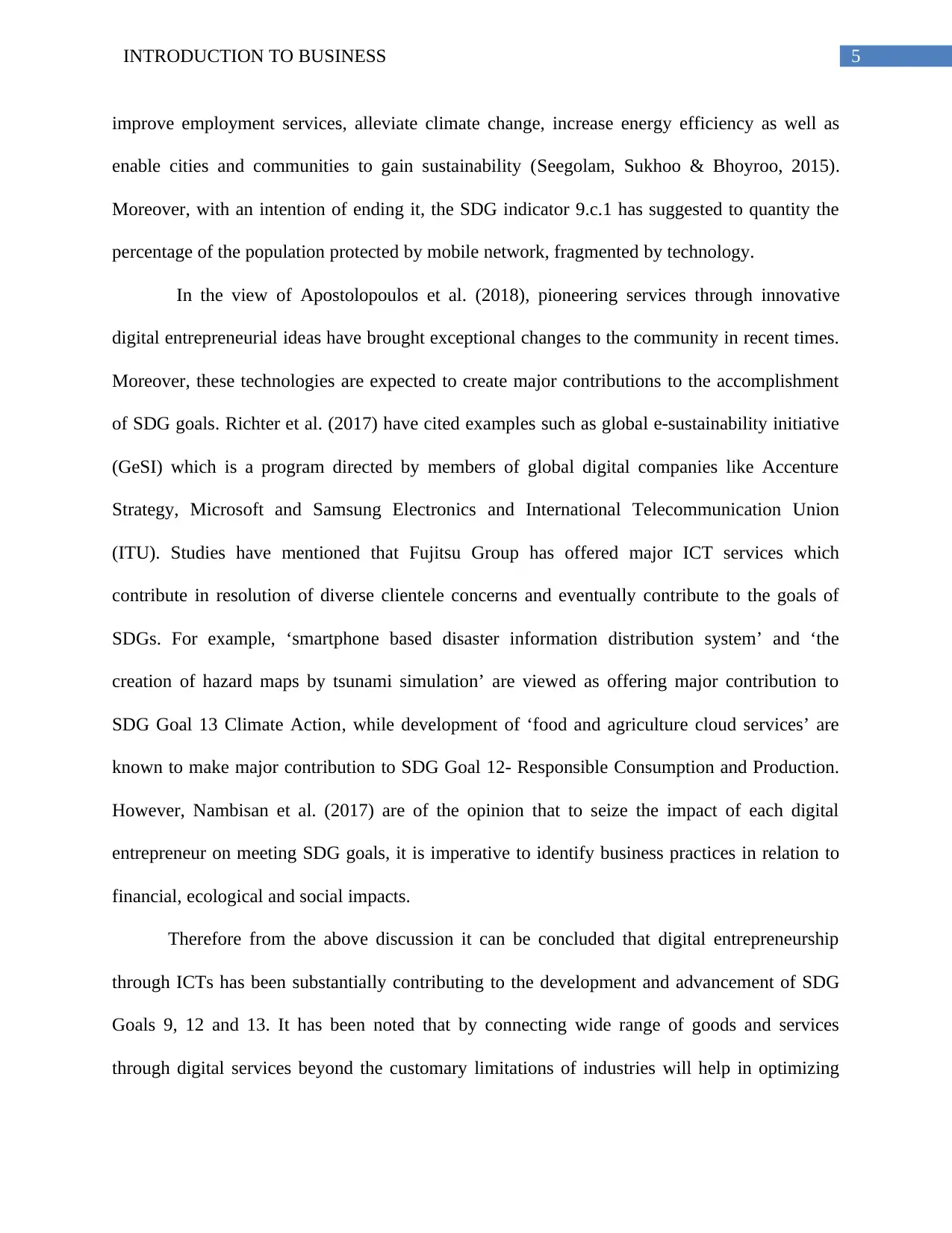
5INTRODUCTION TO BUSINESS
improve employment services, alleviate climate change, increase energy efficiency as well as
enable cities and communities to gain sustainability (Seegolam, Sukhoo & Bhoyroo, 2015).
Moreover, with an intention of ending it, the SDG indicator 9.c.1 has suggested to quantity the
percentage of the population protected by mobile network, fragmented by technology.
In the view of Apostolopoulos et al. (2018), pioneering services through innovative
digital entrepreneurial ideas have brought exceptional changes to the community in recent times.
Moreover, these technologies are expected to create major contributions to the accomplishment
of SDG goals. Richter et al. (2017) have cited examples such as global e-sustainability initiative
(GeSI) which is a program directed by members of global digital companies like Accenture
Strategy, Microsoft and Samsung Electronics and International Telecommunication Union
(ITU). Studies have mentioned that Fujitsu Group has offered major ICT services which
contribute in resolution of diverse clientele concerns and eventually contribute to the goals of
SDGs. For example, ‘smartphone based disaster information distribution system’ and ‘the
creation of hazard maps by tsunami simulation’ are viewed as offering major contribution to
SDG Goal 13 Climate Action, while development of ‘food and agriculture cloud services’ are
known to make major contribution to SDG Goal 12- Responsible Consumption and Production.
However, Nambisan et al. (2017) are of the opinion that to seize the impact of each digital
entrepreneur on meeting SDG goals, it is imperative to identify business practices in relation to
financial, ecological and social impacts.
Therefore from the above discussion it can be concluded that digital entrepreneurship
through ICTs has been substantially contributing to the development and advancement of SDG
Goals 9, 12 and 13. It has been noted that by connecting wide range of goods and services
through digital services beyond the customary limitations of industries will help in optimizing
improve employment services, alleviate climate change, increase energy efficiency as well as
enable cities and communities to gain sustainability (Seegolam, Sukhoo & Bhoyroo, 2015).
Moreover, with an intention of ending it, the SDG indicator 9.c.1 has suggested to quantity the
percentage of the population protected by mobile network, fragmented by technology.
In the view of Apostolopoulos et al. (2018), pioneering services through innovative
digital entrepreneurial ideas have brought exceptional changes to the community in recent times.
Moreover, these technologies are expected to create major contributions to the accomplishment
of SDG goals. Richter et al. (2017) have cited examples such as global e-sustainability initiative
(GeSI) which is a program directed by members of global digital companies like Accenture
Strategy, Microsoft and Samsung Electronics and International Telecommunication Union
(ITU). Studies have mentioned that Fujitsu Group has offered major ICT services which
contribute in resolution of diverse clientele concerns and eventually contribute to the goals of
SDGs. For example, ‘smartphone based disaster information distribution system’ and ‘the
creation of hazard maps by tsunami simulation’ are viewed as offering major contribution to
SDG Goal 13 Climate Action, while development of ‘food and agriculture cloud services’ are
known to make major contribution to SDG Goal 12- Responsible Consumption and Production.
However, Nambisan et al. (2017) are of the opinion that to seize the impact of each digital
entrepreneur on meeting SDG goals, it is imperative to identify business practices in relation to
financial, ecological and social impacts.
Therefore from the above discussion it can be concluded that digital entrepreneurship
through ICTs has been substantially contributing to the development and advancement of SDG
Goals 9, 12 and 13. It has been noted that by connecting wide range of goods and services
through digital services beyond the customary limitations of industries will help in optimizing
⊘ This is a preview!⊘
Do you want full access?
Subscribe today to unlock all pages.

Trusted by 1+ million students worldwide
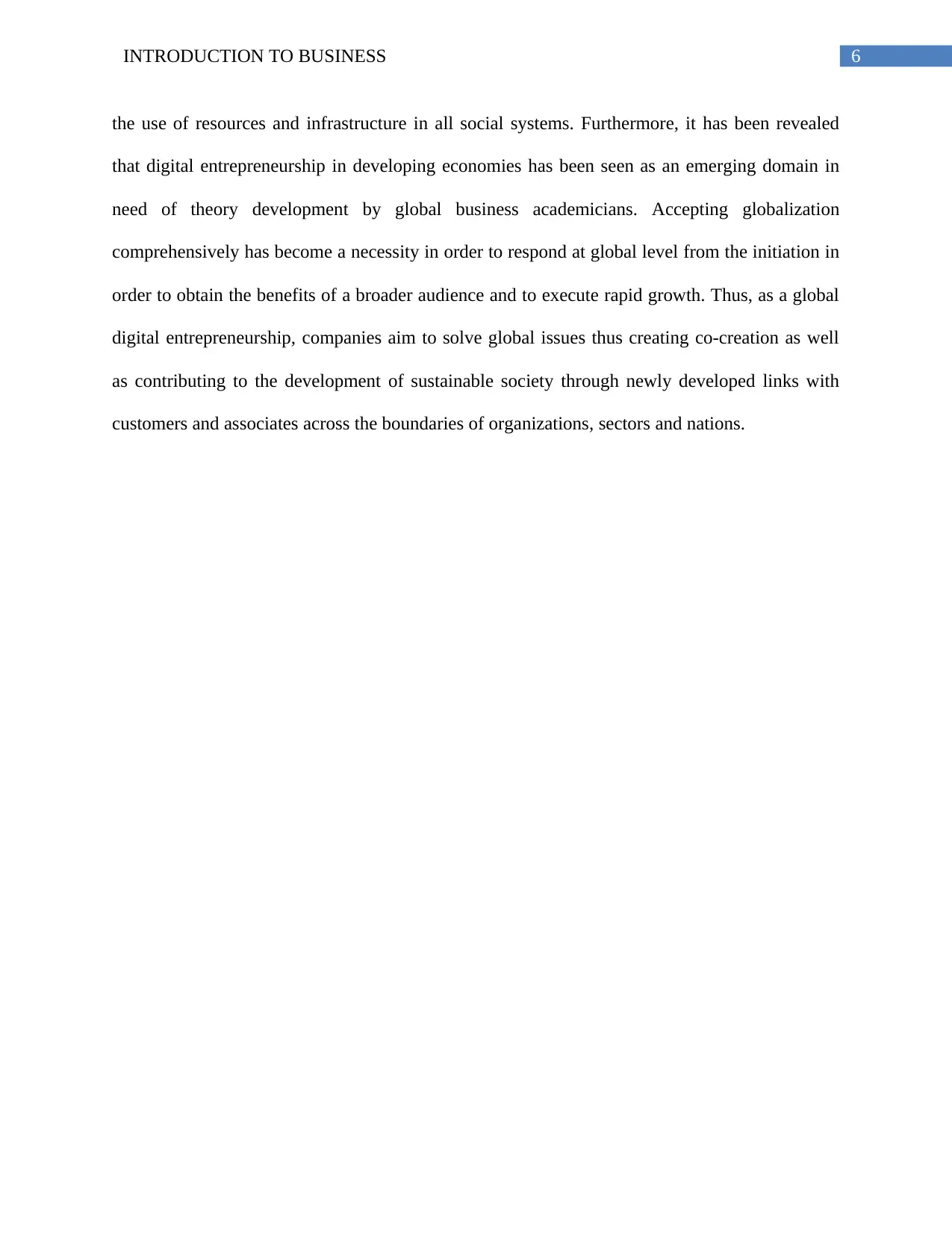
6INTRODUCTION TO BUSINESS
the use of resources and infrastructure in all social systems. Furthermore, it has been revealed
that digital entrepreneurship in developing economies has been seen as an emerging domain in
need of theory development by global business academicians. Accepting globalization
comprehensively has become a necessity in order to respond at global level from the initiation in
order to obtain the benefits of a broader audience and to execute rapid growth. Thus, as a global
digital entrepreneurship, companies aim to solve global issues thus creating co-creation as well
as contributing to the development of sustainable society through newly developed links with
customers and associates across the boundaries of organizations, sectors and nations.
the use of resources and infrastructure in all social systems. Furthermore, it has been revealed
that digital entrepreneurship in developing economies has been seen as an emerging domain in
need of theory development by global business academicians. Accepting globalization
comprehensively has become a necessity in order to respond at global level from the initiation in
order to obtain the benefits of a broader audience and to execute rapid growth. Thus, as a global
digital entrepreneurship, companies aim to solve global issues thus creating co-creation as well
as contributing to the development of sustainable society through newly developed links with
customers and associates across the boundaries of organizations, sectors and nations.
Paraphrase This Document
Need a fresh take? Get an instant paraphrase of this document with our AI Paraphraser
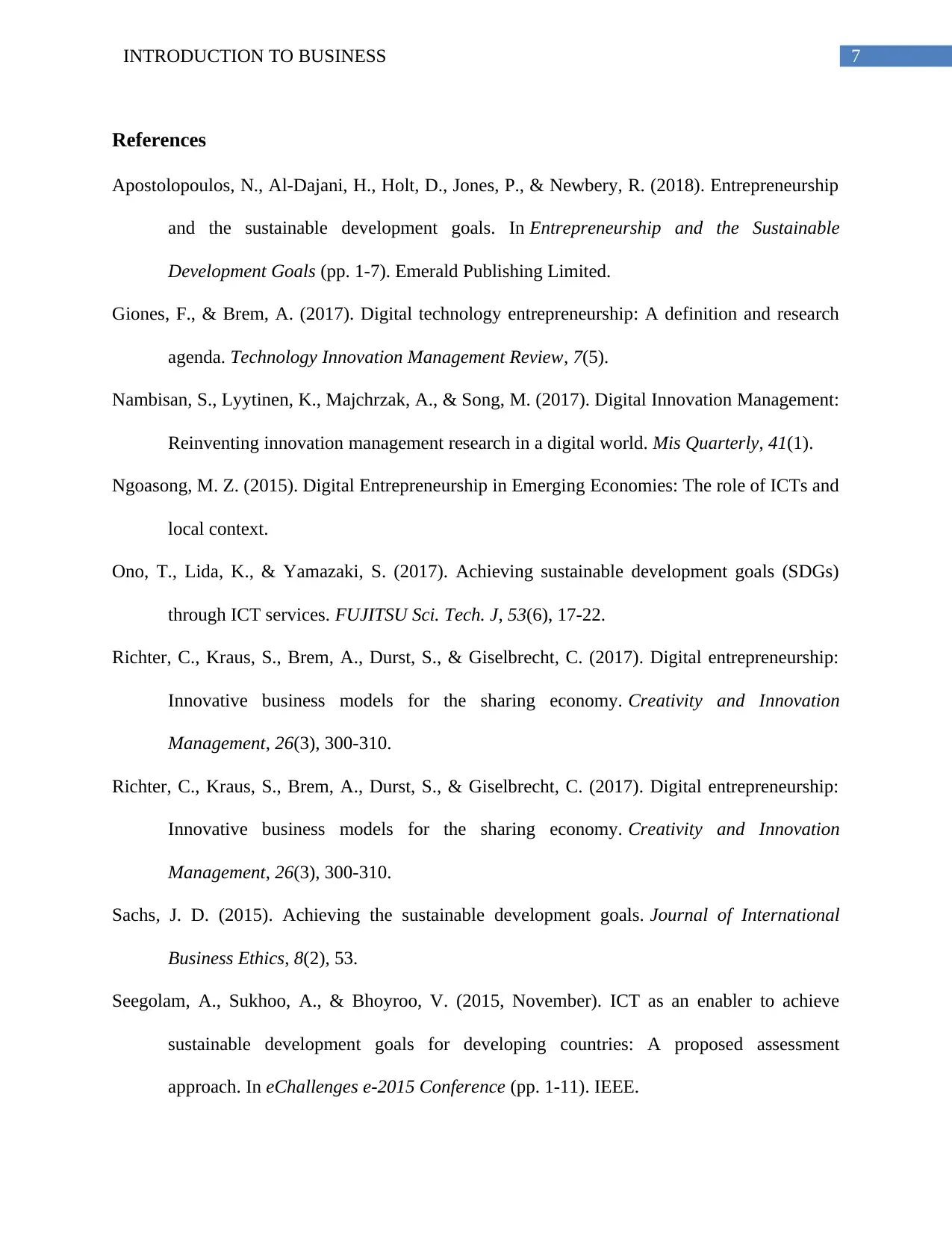
7INTRODUCTION TO BUSINESS
References
Apostolopoulos, N., Al-Dajani, H., Holt, D., Jones, P., & Newbery, R. (2018). Entrepreneurship
and the sustainable development goals. In Entrepreneurship and the Sustainable
Development Goals (pp. 1-7). Emerald Publishing Limited.
Giones, F., & Brem, A. (2017). Digital technology entrepreneurship: A definition and research
agenda. Technology Innovation Management Review, 7(5).
Nambisan, S., Lyytinen, K., Majchrzak, A., & Song, M. (2017). Digital Innovation Management:
Reinventing innovation management research in a digital world. Mis Quarterly, 41(1).
Ngoasong, M. Z. (2015). Digital Entrepreneurship in Emerging Economies: The role of ICTs and
local context.
Ono, T., Lida, K., & Yamazaki, S. (2017). Achieving sustainable development goals (SDGs)
through ICT services. FUJITSU Sci. Tech. J, 53(6), 17-22.
Richter, C., Kraus, S., Brem, A., Durst, S., & Giselbrecht, C. (2017). Digital entrepreneurship:
Innovative business models for the sharing economy. Creativity and Innovation
Management, 26(3), 300-310.
Richter, C., Kraus, S., Brem, A., Durst, S., & Giselbrecht, C. (2017). Digital entrepreneurship:
Innovative business models for the sharing economy. Creativity and Innovation
Management, 26(3), 300-310.
Sachs, J. D. (2015). Achieving the sustainable development goals. Journal of International
Business Ethics, 8(2), 53.
Seegolam, A., Sukhoo, A., & Bhoyroo, V. (2015, November). ICT as an enabler to achieve
sustainable development goals for developing countries: A proposed assessment
approach. In eChallenges e-2015 Conference (pp. 1-11). IEEE.
References
Apostolopoulos, N., Al-Dajani, H., Holt, D., Jones, P., & Newbery, R. (2018). Entrepreneurship
and the sustainable development goals. In Entrepreneurship and the Sustainable
Development Goals (pp. 1-7). Emerald Publishing Limited.
Giones, F., & Brem, A. (2017). Digital technology entrepreneurship: A definition and research
agenda. Technology Innovation Management Review, 7(5).
Nambisan, S., Lyytinen, K., Majchrzak, A., & Song, M. (2017). Digital Innovation Management:
Reinventing innovation management research in a digital world. Mis Quarterly, 41(1).
Ngoasong, M. Z. (2015). Digital Entrepreneurship in Emerging Economies: The role of ICTs and
local context.
Ono, T., Lida, K., & Yamazaki, S. (2017). Achieving sustainable development goals (SDGs)
through ICT services. FUJITSU Sci. Tech. J, 53(6), 17-22.
Richter, C., Kraus, S., Brem, A., Durst, S., & Giselbrecht, C. (2017). Digital entrepreneurship:
Innovative business models for the sharing economy. Creativity and Innovation
Management, 26(3), 300-310.
Richter, C., Kraus, S., Brem, A., Durst, S., & Giselbrecht, C. (2017). Digital entrepreneurship:
Innovative business models for the sharing economy. Creativity and Innovation
Management, 26(3), 300-310.
Sachs, J. D. (2015). Achieving the sustainable development goals. Journal of International
Business Ethics, 8(2), 53.
Seegolam, A., Sukhoo, A., & Bhoyroo, V. (2015, November). ICT as an enabler to achieve
sustainable development goals for developing countries: A proposed assessment
approach. In eChallenges e-2015 Conference (pp. 1-11). IEEE.
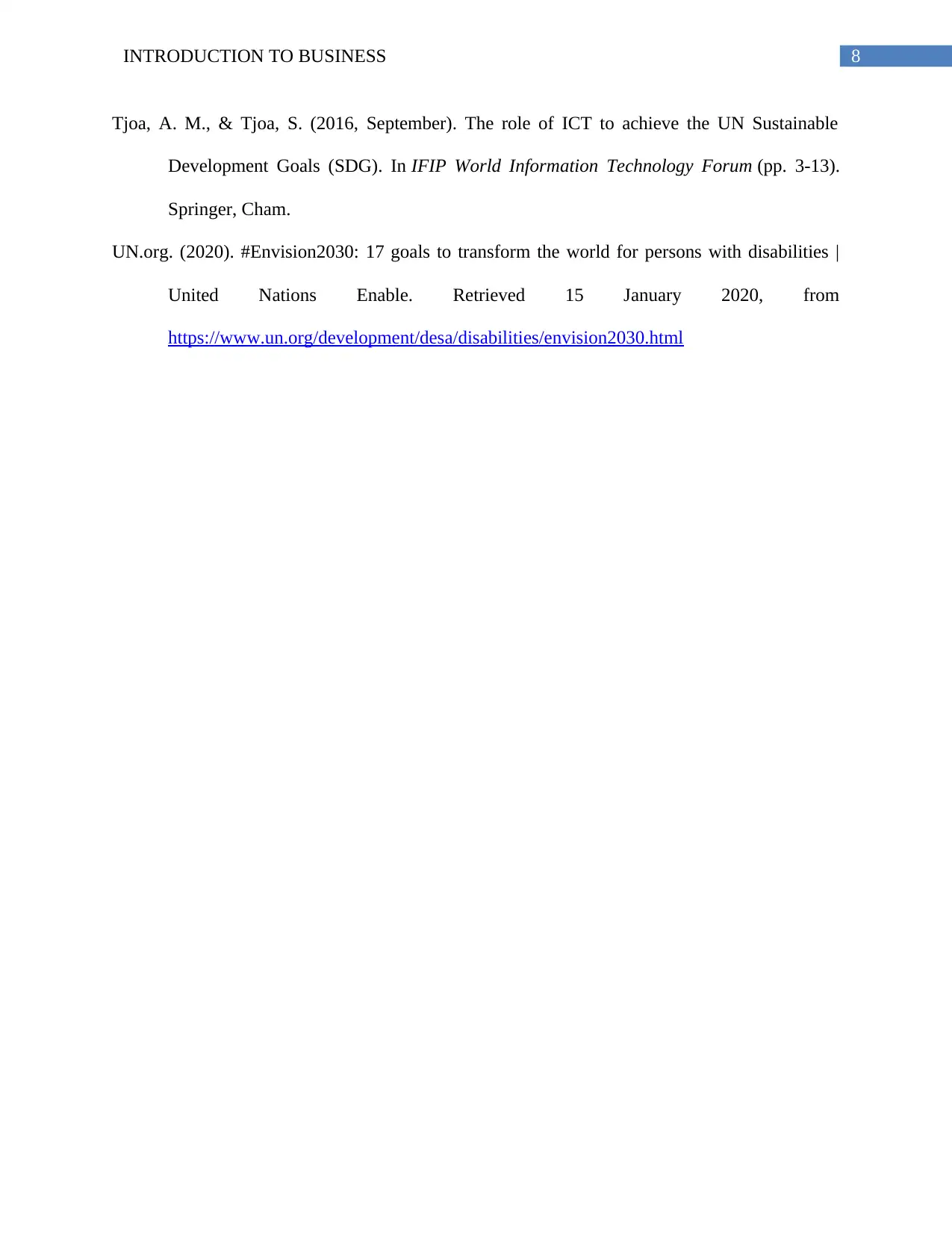
8INTRODUCTION TO BUSINESS
Tjoa, A. M., & Tjoa, S. (2016, September). The role of ICT to achieve the UN Sustainable
Development Goals (SDG). In IFIP World Information Technology Forum (pp. 3-13).
Springer, Cham.
UN.org. (2020). #Envision2030: 17 goals to transform the world for persons with disabilities |
United Nations Enable. Retrieved 15 January 2020, from
https://www.un.org/development/desa/disabilities/envision2030.html
Tjoa, A. M., & Tjoa, S. (2016, September). The role of ICT to achieve the UN Sustainable
Development Goals (SDG). In IFIP World Information Technology Forum (pp. 3-13).
Springer, Cham.
UN.org. (2020). #Envision2030: 17 goals to transform the world for persons with disabilities |
United Nations Enable. Retrieved 15 January 2020, from
https://www.un.org/development/desa/disabilities/envision2030.html
⊘ This is a preview!⊘
Do you want full access?
Subscribe today to unlock all pages.

Trusted by 1+ million students worldwide
1 out of 9
Related Documents
Your All-in-One AI-Powered Toolkit for Academic Success.
+13062052269
info@desklib.com
Available 24*7 on WhatsApp / Email
![[object Object]](/_next/static/media/star-bottom.7253800d.svg)
Unlock your academic potential
Copyright © 2020–2025 A2Z Services. All Rights Reserved. Developed and managed by ZUCOL.




